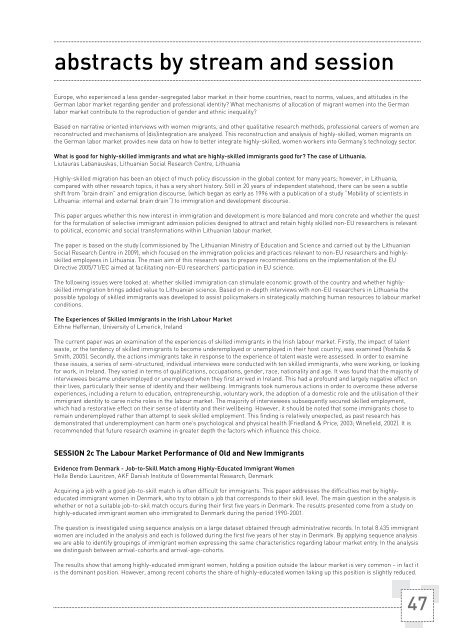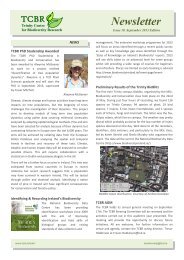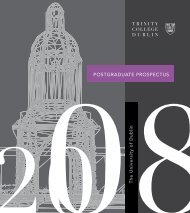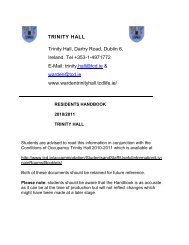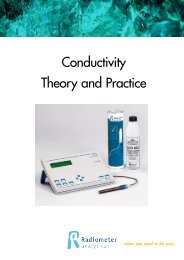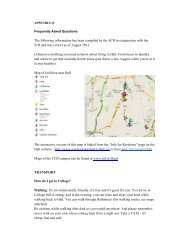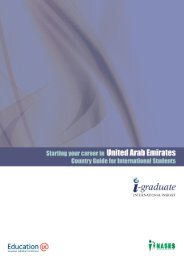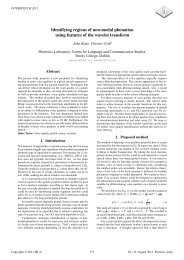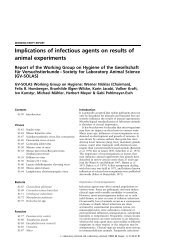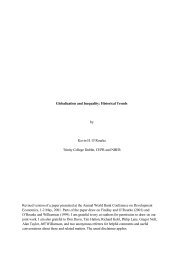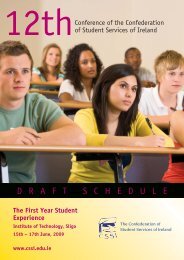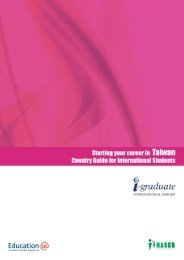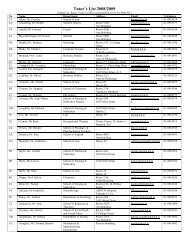Conference Programme (PDF, 1019KB) - Trinity College Dublin
Conference Programme (PDF, 1019KB) - Trinity College Dublin
Conference Programme (PDF, 1019KB) - Trinity College Dublin
Create successful ePaper yourself
Turn your PDF publications into a flip-book with our unique Google optimized e-Paper software.
abstracts by stream and session<br />
Europe, who experienced a less gender-segregated labor market in their home countries, react to norms, values, and attitudes in the<br />
German labor market regarding gender and professional identity? What mechanisms of allocation of migrant women into the German<br />
labor market contribute to the reproduction of gender and ethnic inequality?<br />
Based on narrative oriented interviews with women migrants, and other qualitative research methods, professional careers of women are<br />
reconstructed and mechanisms of (dis)integration are analyzed. This reconstruction and analysis of highly-skilled, women migrants on<br />
the German labor market provides new data on how to better integrate highly-skilled, women workers into Germany’s technology sector.<br />
What is good for highly-skilled immigrants and what are highly-skilled immigrants good for? The case of Lithuania.<br />
Liutauras Labanauskas, Lithuanian Social Research Centre, Lithuania<br />
Highly-skilled migration has been an object of much policy discussion in the global context for many years; however, in Lithuania,<br />
compared with other research topics, it has a very short history. Still in 20 years of independent statehood, there can be seen a subtle<br />
shift from “brain drain” and emigration discourse, (which began as early as 1996 with a publication of a study “Mobility of scientists in<br />
Lithuania: internal and external brain drain”) to immigration and development discourse.<br />
This paper argues whether this new interest in immigration and development is more balanced and more concrete and whether the quest<br />
for the formulation of selective immigrant admission policies designed to attract and retain highly skilled non-EU researchers is relevant<br />
to political, economic and social transformations within Lithuanian labour market.<br />
The paper is based on the study (commissioned by The Lithuanian Ministry of Education and Science and carried out by the Lithuanian<br />
Social Research Centre in 2009), which focused on the immigration policies and practices relevant to non-EU researchers and highlyskilled<br />
employees in Lithuania. The main aim of this research was to prepare recommendations on the implementation of the EU<br />
Directive 2005/71/EC aimed at facilitating non-EU researchers’ participation in EU science.<br />
The following issues were looked at: whether skilled immigration can stimulate economic growth of the country and whether highlyskilled<br />
immigration brings added value to Lithuanian science. Based on in-depth interviews with non-EU researchers in Lithuania the<br />
possible typology of skilled immigrants was developed to assist policymakers in strategically matching human resources to labour market<br />
conditions.<br />
The Experiences of Skilled Immigrants in the Irish Labour Market<br />
Eithne Heffernan, University of Limerick, Ireland<br />
The current paper was an examination of the experiences of skilled immigrants in the Irish labour market. Firstly, the impact of talent<br />
waste, or the tendency of skilled immigrants to become underemployed or unemployed in their host country, was examined (Yoshida &<br />
Smith, 2005). Secondly, the actions immigrants take in response to the experience of talent waste were assessed. In order to examine<br />
these issues, a series of semi-structured, individual interviews were conducted with ten skilled immigrants, who were working, or looking<br />
for work, in Ireland. They varied in terms of qualifications, occupations, gender, race, nationality and age. It was found that the majority of<br />
interviewees became underemployed or unemployed when they first arrived in Ireland. This had a profound and largely negative effect on<br />
their lives, particularly their sense of identity and their wellbeing. Immigrants took numerous actions in order to overcome these adverse<br />
experiences, including a return to education, entrepreneurship, voluntary work, the adoption of a domestic role and the utilisation of their<br />
immigrant identity to carve niche roles in the labour market. The majority of interviewees subsequently secured skilled employment,<br />
which had a restorative effect on their sense of identity and their wellbeing. However, it should be noted that some immigrants chose to<br />
remain underemployed rather than attempt to seek skilled employment. This finding is relatively unexpected, as past research has<br />
demonstrated that underemployment can harm one’s psychological and physical health (Friedland & Price, 2003; Winefield, 2002). It is<br />
recommended that future research examine in greater depth the factors which influence this choice.<br />
SESSION 2c The Labour Market Performance of Old and New Immigrants<br />
Evidence from Denmark - Job-to-Skill Match among Highly-Educated Immigrant Women<br />
Helle Bendix Lauritzen, AKF Danish Institute of Governmental Research, Denmark<br />
Acquiring a job with a good job-to-skill match is often difficult for immigrants. This paper addresses the difficulties met by highlyeducated<br />
immigrant women in Denmark, who try to obtain a job that corresponds to their skill level. The main question in the analysis is<br />
whether or not a suitable job-to-skil match occurs during their first five years in Denmark. The results presented come from a study on<br />
highly-educated immigrant women who immigrated to Denmark during the period 1990-2001.<br />
The question is investigated using sequence analysis on a large dataset obtained through administrative records. In total 8.435 immigrant<br />
women are included in the analysis and each is followed during the first five years of her stay in Denmark. By applying sequence analysis<br />
we are able to identify groupings of immigrant women expressing the same characteristics regarding labour market entry. In the analysis<br />
we distinguish between arrival-cohorts and arrival-age-cohorts.<br />
The results show that among highly-educated immigrant women, holding a position outside the labour market is very common – in fact it<br />
is the dominant position. However, among recent cohorts the share of highly-educated women taking up this position is slightly reduced.<br />
47


